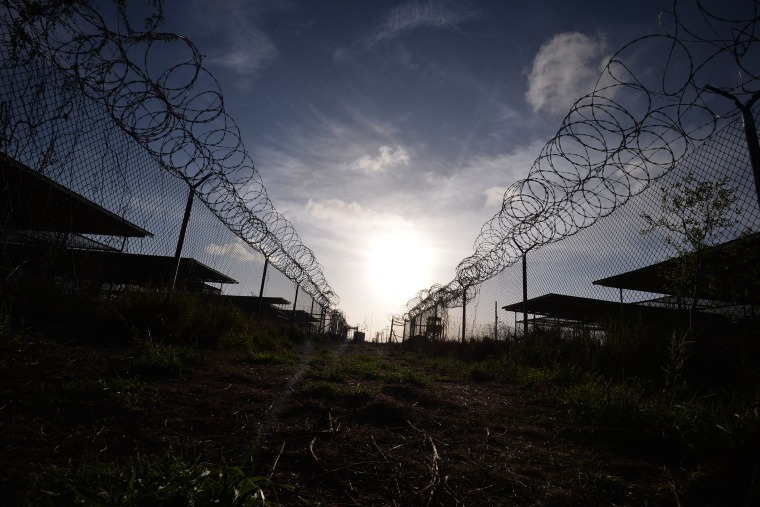In recent months, the Obama administration has successfully transferred quite a few detainees from the prison at Guantanamo Bay, but the developments over the weekend were a little different than most. NBC News reported over the weekend:
Nine detainees from the Guantanamo Bay detention center have been transferred to the government of Saudi Arabia, the Pentagon announced Saturday. Department of Defense officials told NBC News all nine are from Yemen. Among the nine being transferred is Tariq Ali Abdullah Ba Odah, who has been approved for transfer since 2009 and has been on a hunger strike since 2007. As of July 2015, he weighed 74 pounds and was regularly force-fed.
Updating a tally we discussed a couple of weeks ago, the detention facility's population peaked in 2003 with 680 prisoners. It's now down to just 80 -- 26 of whom have already been cleared for transfer. (When Obama first became president, the population stood at 242.)
The point of the gradual reductions, obviously, is to reduce the overall population, but it's also intended to appeal to Congress' sense of fiscal sanity: the smaller the number of detainees, the harder it is to justify the massive expense of keeping open a detention facility that houses so few people. Even if congressional Republicans are inclined to ignore the White House, military leaders, and Bush/Cheney administration veterans, the hope is that GOP lawmakers will at least care about wasteful spending.
But what makes this weekend's announcement so interesting has less to do with the specific tallies and more to do with the country that agreed to work with U.S. officials on these transfers.
The New York Times noted that the diplomatic effort to persuade Saudis to accept Yemeni detainees began under the Bush/Cheney administration. It only led to results very recently. Cliff Sloan, who served as the State Department envoy for negotiating detainee transfers in 2013 and 2014, described the shift to the Times as "a major breakthrough."
NBC News' report added that President Obama will be in Riyadh this week "to meet with Gulf leaders to discuss the threat posed by ISIS." Having this Guantanamo announcement come in advance of the trip marks "a potential turning point in the U.S.'s often fraught relationship with Saudi Arabia."
I can appreciate why scuttlebutt about Obama and 11-dimensional chess can be a little over-dramatized at times, but the weekend's news got me thinking about the president's recent interview with The Atlantic, which caused a stir in many international circles, and which offered Obama an opportunity to highlight his impatience about the state of the U.S. partnership with Saudi Arabia.
In an especially memorable exchange, the article noted a conversation Obama had with Australian Prime Minister Malcolm Turbull in which the U.S. president criticized Saudi funding of Wahhabist madrassas.
"Aren't the Saudis your friends?," Turnbull asked.
Obama smiled. "It's complicated," he said.
Did talk like this spur the Saudis to take steps to get on the White House's good side, reminding the president about the utility of a U.S./Saudi alliance? Did Obama's public skepticism about Saudi intentions prompt the kingdom to rethink a decade of obstinacy over Yemeni detainees? How much of this relates to a pending Senate bill on potential Saudi lawsuits related to 9/11?
We may never know for sure, but given the latest news, it's something to keep in mind.
